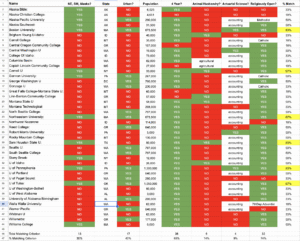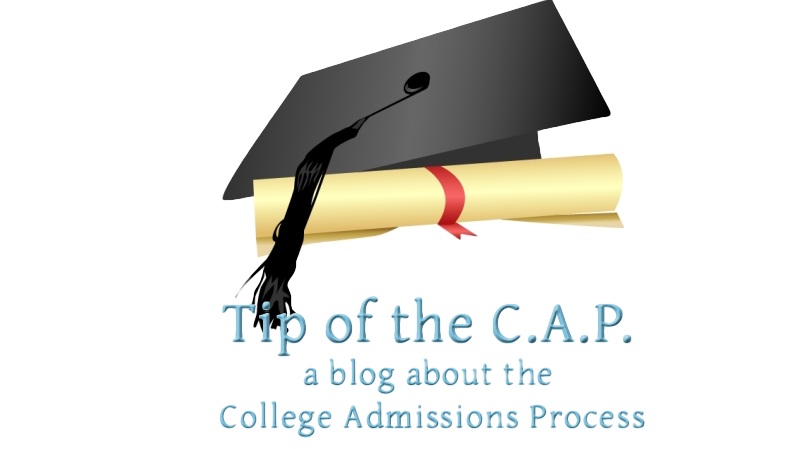Thoughts on ACT’s “AI Advisor” and Why It Is Problematic
 Growing up, I was always very much into technology (it was probably all the Star Trek reruns), and I made a living as an academic technology person at schools for 12 years. But I have long been skeptical of claims from tech companies, and so the rush to add so-called “AI” features in the past few years has been annoying to me. I don’t pretend to understand all of the underpinnings of large language models, but I rely on my fellow Hampshire College alum Dr. Gary Marcus for that.
Growing up, I was always very much into technology (it was probably all the Star Trek reruns), and I made a living as an academic technology person at schools for 12 years. But I have long been skeptical of claims from tech companies, and so the rush to add so-called “AI” features in the past few years has been annoying to me. I don’t pretend to understand all of the underpinnings of large language models, but I rely on my fellow Hampshire College alum Dr. Gary Marcus for that.
Recently, ACT released a beta of an “AI Advisor” that appears to use publicly available data about colleges to help students compile a list of schools that might interest them. I was a college counselor for over eight years, and for the last decade have worked for Method Learning (a company that helps students prepare for college) and I have always thought that the creation of a preliminary list of colleges is one of the most important parts of the college process. I would interview my students (and their families) to learn what mattered to them, what their interests and future goals were, what their financial limits were, and other questions; afterwards, I would put together a list of around 20 colleges for the student to explore. After giving them the list, I would show them various college research tools and assign them the task of increasing the list to c. 40 colleges before our next meeting, with an eventual goal of whittling down the list to the 5-7 colleges to which they would ultimately apply.
Not every college applicant has access to a college counselor with the time or experience to do what I have just described, so it is important that students have access to college search tools like Method Learning’s, or Big Future from the College Board (the maker of the SAT) or the College Navigator from the National Center for Education Statistics. Those programs ask simple questions and have students use sliders, check boxes and pull-down menus to provide answers that filter results from a common database. Clearly ACT (or their new private equity masters) felt that it was important to have their own version, and decided to gussy it up with AI.
I took ACT AI Advisor for a spin the other day, and found the experience to be frustrating in several ways, specifically:
- it took a long time to generate results
- the results output often seemed unrelated to my input
- it did not seem to be interested in asking about college affordability/financing
- the interface is confined to a small window that is hard to scroll through, and the “export chat” feature didn’t work
On the other hand, it was clear that some effort was made to program the AI to provide friendly answers and some contextual explanations that resembled the kind of responses that an actual human college counselor would hopefully provide, which was good to see.
I wanted to “push” the AI Advisor and I also wanted to be able to check its suggestions for accuracy, so I decided that I would tell it I was a student with the following characteristics/interests:
- high grades/low test scores
- desire to major in animal husbandry or actuarial science
- desire to attend college at a large urban 4-year college or university
- only interested in the northeast, the southwest, or Alaska
I also told it that I was a member of the Unification Church, but was quite interested in the Baha’i faith, and that I had diagnosed learning differences and required support. The following screenshots give an idea of what the interface is like:


As you can see, the AI chatbot has a friendly, open demeanor that might make students feel encouraged to give detailed answers. It generated a preliminary list, and then started asking follow up questions, which were very repetitive. When I called it out, the chatbot would say “you’re right, I did ask about that. Thanks for catching that!” but further answers would result in the list of suggestions changing. Ultimately, after about 10 minutes of Q and A, a list was generated for me.
I put the list into a spreadsheet and sorted it alphabetically; as you can see, I wound up with over forty suggestions! However, when I did an accuracy check to see how well the suggestions matched with my main criteria:
Location: northeast, southwest, Alaska
Urban
4 Year
Majors Available: animal husbandry (or related) and actuarial science
Open to different religious backgrounds
the results were disappointing.

Only 30% of the suggestions matched my geographic criteria, only 40% were “urban” (according to Big Future, and I included the population of the town for further perspective), and worst of all, hardly any of the suggestions listed as available majors the things I told it I wanted to study. Granted, I picked oddball majors but still. In my career there were definitely times when I made lists for students where I would stretch outside their stated interests if I thought it would help them to find a good match, but I wouldn’t completely ignore what they told me; ultimately this list of 43 schools only has six suggestions that have four or more of my six criteria, which is not very satisfactory.
Deciding to give the AI Advisor another chance, I came back and told it that I wanted to start over. It said “No problem at all! We can totally start fresh”, but unfortunately it was not as easily done as said, because it still “remembered” some of my previous answers. Perhaps this is a bug that they will work out before the program leaves beta testing, but if not, it would be problematic, especially if a student came back to the AI Advisor months or years after first inputting criteria.
This second time I said that I wanted to study accounting at Massachusetts schools of 10,000 or more students; I purposely chose those criteria because it would limit the possible responses. Unfortunately, the list that was generated included community colleges, art schools, and others that did not match my request, but when I queried the AI Advisor, the answer made total sense:

Honestly, that is phrased pretty much how I would say it, and it continues the overall theme of never being so negative that it could tempt a student to “shut down” or stop engaging. So well done, AI Advisor!
I applaud the AI Advisor’s programmers for building in responsible adult-sounding responses to immature answers. For instance, when it asked me what kind of college environment I wanted:

However, this response seems to try to walk the line between making the student feel comfortable with being honest while also noting that one can avoid “risky situations”; honestly I would prefer it to be a little more direct when a student indicates a willingness to engage in self-destructive behavior, at least mentioning things like college health centers and the services they provide.
While there are definitely user interface benefits to allowing a student to engage in natural language interaction with the college search tool, I don’t know if the benefits outweigh the costs. In terms of energy usage, estimates are that by 2028, AI computation could consume as much energy as 22% of American homes. Is it worth all the extra carbon emissions to avoid buttons, sliders and checkboxes? Also, unlike a normal college search tool where a reset button actually lets users start over, the AI Advisor seemed to find it hard to stop using invalid criteria. Finally, unlike other search tools, the AI Advisor doesn’t make it easy to actually learn about the suggested institutions. For instance, when I clicked on the University of Massachusetts-Amherst suggestion, all I got was this:

The “sources” list is hard to understand, and it doesn’t differentiate between sources nor does it attempt to tell students if one is more authoritative than the rest. And the links go to top-level pages, so there is no easy way to follow those links to get more details about UMass.

Overall, I find this to be a half-baked solution to a problem that doesn’t exist. Perhaps, much like how the new “enhanced ACT” exam’s enhancements seem limited to making the test shorter and easier the goal is to draw students into the ACT ecosystem and keep them there (as opposed to their using Big Future and opting to take the SAT). But students who lack access to helpful, dedicated college counselors will not find the beta version of the AI Advisor to meet their needs.
But this is just my opinion and I haven’t written a blog post for six years. What do you think? If you test drive the ACT AI Advisor please let me know what your experience was like in the comments.

Leave a Reply